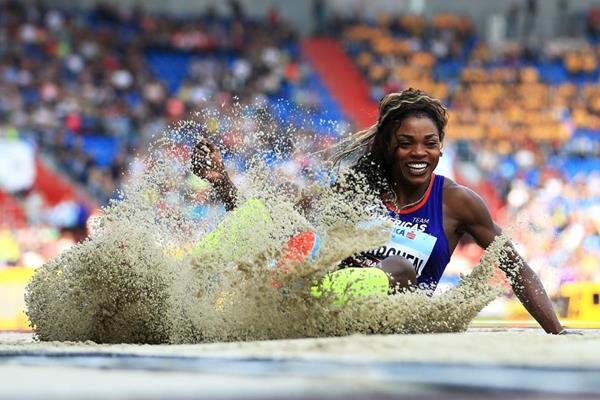Caterine Ibarguen, campeona de salto triple de Río 2016 en Colombia, se enfrentó a su némesis competitiva, Olga Rypakova de Kazajstán, para ganar la competencia para el equipo de las Américas.
El capitán del equipo de las Américas, Mike Powell, había anunciado la decisión del comodín justo antes de que comenzara la competencia.
Él confiaba en Ibarguen y su compañero de equipo en los Estados Unidos Tori Franklin, que encabezan las listas del mundo 2018 con 14.96m y 14.84m respectivamente, dominando de nuevo para permitir duplicar su total de puntos en conjunto, aunque solo uno de ellos podría progresar más allá de las tres rondas de clasificación como representante de su continente.
Un esfuerzo de apertura de 14.31m desde Ibarguen fue suficiente para encabezar la calificación, asegurando que pasó a la semifinal con el saltador de mayor rango de cada continente.
La mejor marca de Franklin, de 14.27m, le valió su quinto puesto y cuatro puntos.
En la cuarta ronda, el representante de África, Zinzi Chabangua, no pudo continuar, lo que dejó a tres competidores impugnando el desempate final decisivo.
Rypakova, representante de Asia Pacífico, logró 14.26m, y Paraskevi Papachristou de Team Europa llegó a 14.22m, que fue el objetivo para la colombiana como el última en salir en la ronda.
El esfuerzo de Ibarguen de 14.76m la llevó a la final de la quinta ronda contra la mujer que la derrotó en el título de Londres 2012 y, cuatro años después, terminó su racha de victorias en 34.
Al final, sin embargo, fue la atleta kazaja quien sucumbió a la presión, al no registrar una marca legal, lo que significaba que todo lo que Ibarguen tenía que hacer era registrar una marca legal, y 14.54m era más que suficiente.
Mientras estaba parada en la arena, con los brazos en alto, la decisión de los bromistas de las Américas fue reivindicada ya que su puntaje combinado de 12 puntos ganó el evento de Asia y Europa, quienes anotaron nueve puntos.
«Dado que las reglas de la competencia son nuevas, tuve que desafiarme a mí misma de una manera diferente», dijo Ibarguen. «Fue exigente, pero quería hacer lo mejor para el equipo de Estados Unidos».
Caterine Ibarguen, the Rio 2016 triple jump champion from Colombia, faced down her competitive nemesis, Olga Rypakova of Kazakhstan, to win for Team Americas and ensure that their gamble on playing their women’s joker for the day on this event paid off.
Team Americas’ captain, Mike Powell, had announced the joker decision just before competition began.
He was banking upon Ibarguen and her United States team-mate Tori Franklin, who top the world 2018 lists with 14.96m and 14.84m respectively, dominating again to enable their joint points total to be doubled – albeit that only one of them would be able to progress beyond the three qualifying rounds as their continent’s representative.
An opening effort of 14.31m from Ibarguen was enough to head qualifying, ensuring she went through to the semi-final involving the highest ranked jumper from each continent.
Franklin’s best of 14.27m earned her fifth place, and four points.
In the fourth round, Africa’s representative Zinzi Chabangua was unable to continue, which left three competitors contesting the final decisive jump-off.
Rypakova, representing Asia Pacific, managed 14.26m, and Team Europe’s Paraskevi Papachristou reached 14.22m, which was the target for the flamboyant Colombian as the last to go in the round.
Ibarguen’s effort of 14.76m saw her through to the fifth-round finale against the woman who beat her to the London 2012 title and, four years later, ended her run of victories at 34.
In the end, however, it was the Kazakh athlete who succumbed to the pressure, failing to register a legal mark, which meant that all Ibarguen had to do was register a legal mark – and 14.54m was more than sufficient.
As she stood in the sand, arms aloft, the Americas joker decision was vindicated as their combined score of 12 points won the event from Asia and Europe, who both scored nine points.
«Since the rules of the competition are new, I had to challenge myself in a different way,» Ibarguen said. «It was demanding but I wanted to do my best for Team America.»
IAAF.org



